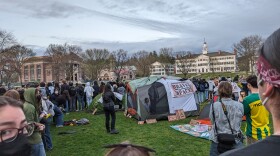Samuel Alicea is a wide receiver on the Tilton School football team. He's seventeen years old. He's black. And he's a protester. About a year ago, when he was a student at Merrimack Valley High School, he knelt in protest during the national anthem, following the lead of Colin Kaepernick, who knelt in support of the Black Lives Matter movement.
The response was swift and ugly. Alicea left Merrimack Valley for Tilton School, where his family says he's safer. He spoke with NHPR's Peter Biello about what the year since his controversial protest has been like for him.
Tell me about the first time last year when you decided to protest. What was that moment like for you?
That was exhilarating. My heart was beating so fast when I first did it. People don’t realize how nervous I was. I gave it a confident look but deep down, I was scared of the outcome I was going to get, possible friends I might lose. It was a surreal feeling, though, because it felt good to really do something to make a change.
Were you thinking about it for a long time before you did it?
Absolutely, I planned it. I really planned it a day before. I hadn’t thought about it for that long. At first I wasn’t one hundred percent for it. I watched an interview with Ray Lewis and I kind of took his side. He said there’s many ways to protest, but don’t bring the flag into it.
But then I looked around at the things that were happening and that this was, at this point, the only way. It seems like the most peaceful way. There isn’t really any other way that attention could be drawn towards black lives and equality within the country as a whole.

Let me ask you about your own personal experience leading up to that moment when you decided to take a knee during the national anthem. What was it about your experience that made you feel like you, in addition to someone like Colin Kaepernick, needed to take a stand?
The thing about where I was—there are two different types of racism. There’s the out-in-the-open racism and then there’s the underhanded racism, where someone sees me walking down the street and their first question is: “Oh, do you play basketball?” And then there’s out-in-the-open racism. If I’m walking down the street and I get yelled at and called the N-word—those are two different things.
In New Hampshire, what I deal with the most is the underhanded racism. I see a lot of people around me with skin color similar to mine, maybe darker, go through the same thing and don’t even realize it.
So to answer your question: I dealt with the underhanded and I see people deal with the underhanded and I see people deal with the out-in-the-open. Regardless, it’s still racism, and I wanted to do something about it.
It’s been a year since you first decided to kneel during the national anthem. You did it a few times, right?
Correct, I did it almost every single game. I started during the third game, I believe.
Tell me about how your last school year at Merrimack Valley went. How was that last school year? What happened that prompted you to leave?
It really got out of hand when someone shot a BB gun through my grandmother’s windshield. That was probably the sparking point. But it was a series of things. People saying they would fight me if I did it. They would hit me. People telling me to get off the field while I was playing. People calling me names right behind my mother and grandmother and family friends that came to watch. So it was a build-up, definitely. I can’t think of anything besides a BB gun being shot through my grandmother’s car that really set it off.
Some folks may see this interview and say, “Oh, there’s that kid who took a knee. I don’t even care what he has to say because he disrespected my flag.” What do you really wish they could know about you and your experience that may make them reconsider that point of view?
I want them to know that I’m still a human like them. My blood is still red like theirs. And I have a mother and a grandmother that see the things that people say. I’m a 17-year-old child and I know people are going to say, “Well, you’re 17, but you made the decision to kneel, so you must be old enough to take criticism.” Which isn’t incorrect. I can take a hit. I can take criticism. But I don’t want to see my grandmother and my mother and my cousins and uncles and aunts and whoever else, my friends, upset or affected by this at all because they didn’t ask for it. This isn’t something that I want to drag them into and that isn’t fair at all.
How do you think the protests have evolved in meaning over the past year?
Last year, Colin Kaepernick did it for black lives. He did it for black lives. Black people were getting shot down by police on a weekly basis and nothing was happening. He did it for black lives. And this year, I saw a teenage white girl kneel while she was singing the national anthem. She was the one singing it. I watched her kneel in protest to Donald Trump.
Now, I’m not going to speak on the president, but that is not what that protest was for initially, and that made me upset because it’s almost like the protest is getting whitewashed. It’s like the gentrification of a protest and I didn’t even think that could happen.








